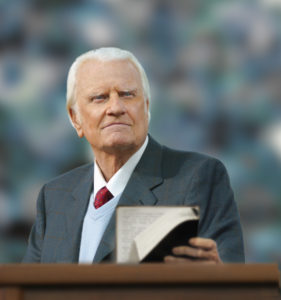There are moments when the passing of a single individual indicates the end of an era. On February 21, 2018, we witnessed just such an event when Billy Graham closed his eyes for the last time here on earth and opened them in the presence of His Lord and Savior, Jesus Christ. Much has been and will be written in the coming days, months, and years as his life and legacy will be evaluated by those both within and without the faith.
 Where does one even begin with someone like Billy Graham? He stood as the singular, monumental figure in evangelicalism during my formative years. If someone asked who the most well-known Christian was of our time, Billy Graham would have topped the list. His crusades were broadcast on national TV. He was a household name. His numerous books and newspaper columns were read by millions of people, even those who did not accept Christ as Lord. The integrity with which he conducted his ministry was unimpeachable, even though an age when preachers on TV were constantly finding themselves in some sort of moralistic or ethical hot water. He was a confidant to US presidents, yet cared deeply about those who were powerless. He was driven by one thing: to preach the power of the Gospel of Jesus Christ.
Where does one even begin with someone like Billy Graham? He stood as the singular, monumental figure in evangelicalism during my formative years. If someone asked who the most well-known Christian was of our time, Billy Graham would have topped the list. His crusades were broadcast on national TV. He was a household name. His numerous books and newspaper columns were read by millions of people, even those who did not accept Christ as Lord. The integrity with which he conducted his ministry was unimpeachable, even though an age when preachers on TV were constantly finding themselves in some sort of moralistic or ethical hot water. He was a confidant to US presidents, yet cared deeply about those who were powerless. He was driven by one thing: to preach the power of the Gospel of Jesus Christ.
 In many ways, Billy Graham was just an average person. It wasn’t that he was an orator on the level of Jonathan Edwards or George Whitefield, nor did his appeal come from the physical attractiveness of a movie star. Though he served as the president of Northwestern Schools (which consisted of a liberal arts college, a Bible school, and a seminary), he was not what we might deem as “highly educated,” with his highest degree being a B.A. from Wheaton College. He grew up on a dairy farm. So, what was it about him that made him so remarkable that he would come to be known as “America’s Pastor”? It was simply this: he was faithfully obedient to God’s Word and God’s calling. Much has been made about how he wrestled with the question of the infallibility of the Bible, especially in light of the constant barrage from his former-evangelist-turned-agnostic friend Charles Templeton. He settled that issue in his own heart in a wooded area in southern California, and from that day on the phrases “the Bible says” and “Jesus says” would permeate his sermons and messages. If the Bible said it, Billy Graham preached it.
In many ways, Billy Graham was just an average person. It wasn’t that he was an orator on the level of Jonathan Edwards or George Whitefield, nor did his appeal come from the physical attractiveness of a movie star. Though he served as the president of Northwestern Schools (which consisted of a liberal arts college, a Bible school, and a seminary), he was not what we might deem as “highly educated,” with his highest degree being a B.A. from Wheaton College. He grew up on a dairy farm. So, what was it about him that made him so remarkable that he would come to be known as “America’s Pastor”? It was simply this: he was faithfully obedient to God’s Word and God’s calling. Much has been made about how he wrestled with the question of the infallibility of the Bible, especially in light of the constant barrage from his former-evangelist-turned-agnostic friend Charles Templeton. He settled that issue in his own heart in a wooded area in southern California, and from that day on the phrases “the Bible says” and “Jesus says” would permeate his sermons and messages. If the Bible said it, Billy Graham preached it.
 That’s not to say that Billy Graham did not wrestle with certain aspects of what the Bible meant in certain doctrinal areas. I remember as a teenager reading the cover story about Graham in a Time magazine in my high school library. I almost couldn’t believe my eyes when I saw him say that He believed that Hell was an eternal separation from God (and that nothing could be worse), but he wasn’t sure if it was a literal lake of fire. I was stunned, to say the least, but I learned a valuable lesson that day: even our greatest heroes aren’t perfect and may not have perfect theology. For all the amazing ways God used Billy Graham to draw individuals to draw people to Himself, Graham remained a flawed person. And it is here that we see another aspect of why he was so widely respected: he admitted it. When he preached about the need for a Savior, it came from a deep understanding of his own need for Christ. He leaned wholly upon the Scripture, knowing it to be completely true even if his understanding of certain secondary and tertiary issues was lacking, and he wanted nothing more than to learn about God by studying the Bible more. What made Billy, Billy, was His faithful obedience to God. What could our Lord do with that kind of faithful obedience in us? Just something to think about…
That’s not to say that Billy Graham did not wrestle with certain aspects of what the Bible meant in certain doctrinal areas. I remember as a teenager reading the cover story about Graham in a Time magazine in my high school library. I almost couldn’t believe my eyes when I saw him say that He believed that Hell was an eternal separation from God (and that nothing could be worse), but he wasn’t sure if it was a literal lake of fire. I was stunned, to say the least, but I learned a valuable lesson that day: even our greatest heroes aren’t perfect and may not have perfect theology. For all the amazing ways God used Billy Graham to draw individuals to draw people to Himself, Graham remained a flawed person. And it is here that we see another aspect of why he was so widely respected: he admitted it. When he preached about the need for a Savior, it came from a deep understanding of his own need for Christ. He leaned wholly upon the Scripture, knowing it to be completely true even if his understanding of certain secondary and tertiary issues was lacking, and he wanted nothing more than to learn about God by studying the Bible more. What made Billy, Billy, was His faithful obedience to God. What could our Lord do with that kind of faithful obedience in us? Just something to think about…

0 Comments